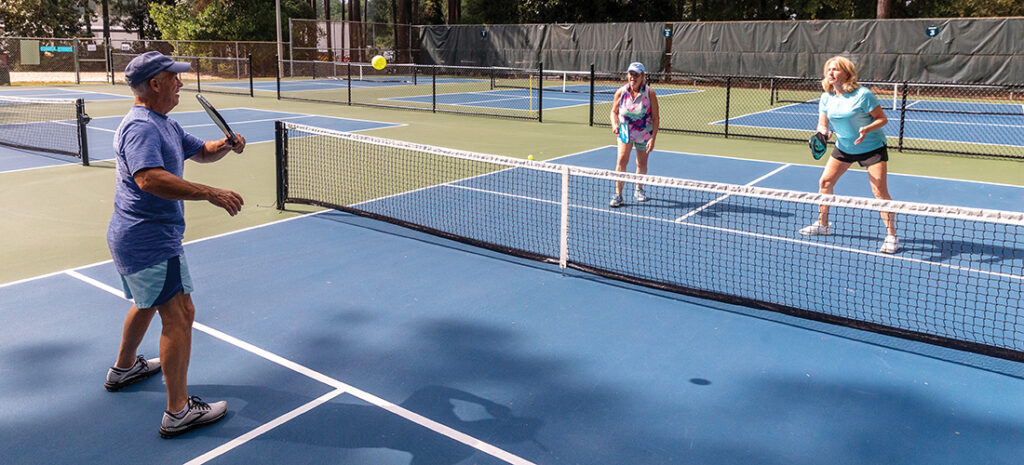Pleasures of Life Dept.

Pickleball Pandemonium
Investigating the recreational craze
By Jenna Biter
Any day of the week, split the baseball fields off W. Morganton Road and pull into the parking lot at Memorial Park, around, say, 8 o’clock in the morning. Directly through the windshield, you’ll see a pair of empty tennis courts, nets sagging low. They seem to let out a prolonged sigh as the color slowly drains from their hard, green faces as if they’re the sad relics of a popular pastime from a past time.
To their left, a constant thwack, thwack, thwacking drowns out the imagined groans of the aging courts next door.
“Hi, Sam or Chuck or Michelle,” somebody inevitably sings as they push through a chain-link gate into a space bubbling with laughter and the sound of endless thwacking spilling out of the half-dozen slick new pickleball courts.
The public facility replaced a different set of sorry tennis courts at the turn of the summer. Since then, the leftover hardcourt has looked on glumly, little more than spectators watching the new kids on the block.
Originally championed by the silver-haired demographic because its play area takes up one third of the real estate of a tennis court, pickleball’s popularity is winning over younger generations, too. More than just the latest excuse to pull a hamstring, it’s the fastest-growing sport in the United States and has been for three years.
With all the hype, from televised matches to pickleball style guides, you’d think the darling of court sports was imagined yesterday by a brilliant Ivy League dropout. Errrrr, wrong. The first pickleball match was played well before Neil Armstrong walked on the moon, in a lazy summer slump of 1965. Determined to entertain their bored children, a gaggle of desperate dads — one of them, Joel Pritchard, a Washington state congressman — slapdashedly devised the sport out of a badminton court, ping-pong paddles and a wiffleball.
Pickleball is the improv sketch of the sports world. Even its name sounds like the butt of a quirky dad joke. So the legend goes, the Pritchard family dog, a cockapoo named Pickles, zig-zagged across the backyard court sniping the game ball, giving the sport its name. In defiance of this urban legend, the Pritchards themselves maintain the pooch ‘n fetch came later. In fact, the paddle sport’s name derived from the term “pickle boat,” rowing slang for a scull full of misfits. Because the sport was thrown together piecemeal, Joel’s wife, Joan, dubbed it pickleball.
After nearly six decades of play, the sport — if it can be elevated to that status, pickleball — has spread from that backyard in Washington, through perhaps a jillion senior centers and YMCAs, to thwack its way into mainstream recreation areas from Seattle to Sarasota, Burbank to Boston.
Its simplicity is a big reason the sport has been so readily adopted. Usually played in doubles, only the serving team can score. The serve must be hit underhand, diagonally to the opposing pair. Faults include: a shot hit out of bounds, a shot that doesn’t clear the net, or when something happens in a no-volley zone called the “kitchen.” Play to 11 and win by two. There are more rules, but that’s enough to get on the court. The skills of Novak Djokovic are not required.
I was no pickleball pro when I arrived at Memorial Park on a golden Friday morning. With a borrowed paddle and my laces cinched down tight, I was as ready as I needed to be to join a warm-up doubles match. “It’s just about getting your paddle on the ball,” one player said, coaxing me onto the court. That first solid thwack snuffed out any pregame jitters. The blunt feedback of a middle-of-the-paddle hit was more satisfying than I could have imagined, although finesse rather than strength is king on the court.
“The challenging part, coming from a tennis background, is you’re used to hitting the ball hard,” says Anne Merkel, a five-to-six day a week pickler. “And that’s not it. The goal is to try to get up close and just dink it. It’s very strategic. Some compare it to playing chess — it’s all about angles.”
I took the advice, finessing the ball left and right, trying to place it out of the opponents’ reach. Sometimes it worked, though not often enough. We lost the truncated scrimmage in a dismal showing, 5–0. Regrettably, I had to go. Revenge would have to wait. Walking to the car, I phoned my husband, “We need pickleball paddles,” I said.
Beginner or advanced, with or without a partner, from sunrise till quits, people tumble into Memorial Park and, smooth like butter, they seamlessly rotate into matches. This is how the courts have been since they opened in June.
“I love it because it’s fun, the camaraderie, but there’s that little bit of competitiveness,” Merkel says. “Pickleball is for everybody.” PS
Jenna Biter is a writer and military wife in the Sandhills. She can be reached at jennabiter@protonmail.com.
